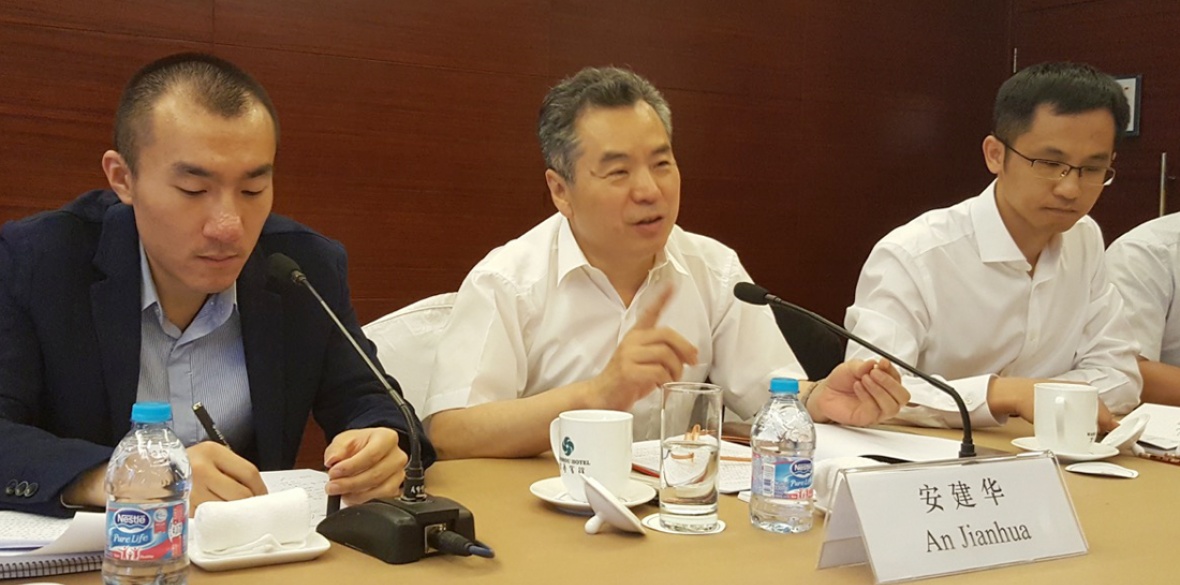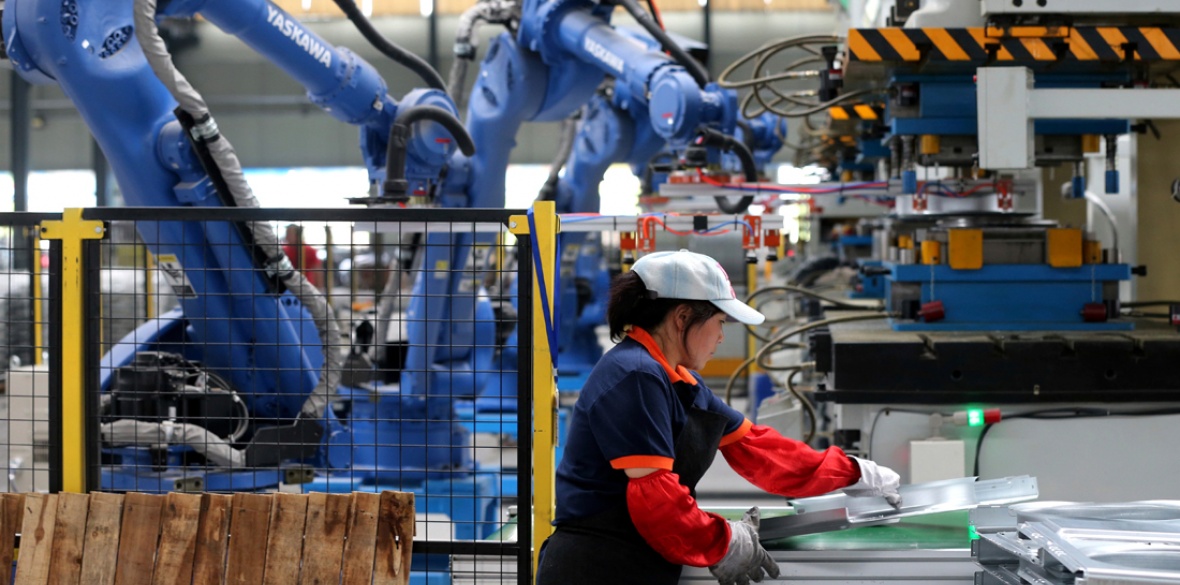This is the last article you can read this month
You can read more article this month
You can read more articles this month
Sorry your limit is up for this month
Reset on:
Please help support the Morning Star by subscribing here
An Jianhua, head of the international department of the All China Federation of Trades Unions (ACFTU), is open and relaxed as he talks to Communist Party leaders from six Western countries.
At very short notice, he had come along to outline the work of the ACFTU and answer a series of searching questions.
The ACFTU was established on May Day 1925, on the initiative of the Communist Party of China (CPC), after four years of preparation in the most unfavourable and repressive conditions.
“Since then, our federation has played an important role in the anti-fascist war, China’s democratic revolution, social reconstruction and reform,” Mr An told the representatives from Canada, Australia, the US, Sweden, Finland and Britain.
This year, assisted by the party, the ACFTU has enjoyed an upsurge in membership to 308 million — more than the International Federation of Trade Unions and the World Federation of Trade Unions put together.
His federation’s place in Chinese society was laid down in law in 1949, as one of the first two legislative measures of the new revolutionary government. It is organised into 10 sectoral unions, each of which has its own provincial, municipal and workplace bodies.
The ACFTU convenes a congress every five years, electing an executive committee which sits in two or three sessions a year, with an elected presidium meeting in between.
Around 600 staff are employed at the ACFTU headquarters in Beijing. According to Mr An, these service a cadre force of nine million across China, including one million full-time officers.
As international secretary, he is responsible for the federation’s relations with the International Labour Organisation, global trade union confederations and some 400 national bodies in other countries.
But relations with trade unions in the advanced capitalist countries have not always been smooth. Anti-communism has played a divisive role, with the ICTU continuing to refuse affiliation to the ACFTU on the grounds that the latter is allegedly “state controlled.”
“We serve the interests of the mass of working people, acting as both a bridge and a bond between them and the Communist Party of China,” Mr An explains.
In practical terms, the ACFTU devotes most of its efforts to representing its members at work, organising skills training, promoting harmonious industrial relations, lobbying for pro-labour reforms and winning support for government policies of balanced economic development and social progress.
Many trade unionists in the West, on the other hand, find it difficult to understand why the ACFTU does not take a more confrontational stance in its dealings with private and public sector employers in China.
Fondly recalling his visit to Unite the Union a few years ago, Mr An does not hesitate to praise the militant, pioneering history of Britain’s trade union movement.
“However, the unions in Britain have not kept pace with a sea-change in the capitalist mode of production that has arisen from the decline of manufacturing and the advances in new technology,” he argues. “The lack of unity between different unions has meant their failure to respond effectively to anti-union attacks and to the need to recruit in the expanding sectors of the economy.”
Strikes are not an effective way of solving the problems of the working class in China
He takes pride in the spread of trade unionism in China. The ACFTU now represents 44 per cent of the labour force compared with density rates of 10 per cent in the US, 15 per cent in Australia, 24 per cent in Britain, 26 per cent in Canada, 65 per cent in Finland and 66 per cent in Sweden.
Nevertheless, Mr An was challenged about changes in China’s constitution which removed the explicit right to strike in 1982, although the 2001 basic law on trade unions acknowledges the reality of industrial action.
“It is not the case that striking is illegal in our country,” he shoots back. “Furthermore, the National People’s Congress and the judiciary can interpret existing laws and take decisions in the interests of the working class.”
In the event of unions and employers failing to agree, matters are referred to local panels of competent people for dispute resolution or arbitration. As many panellists are CPC members, most settlements tend to be favourable to the workers and their unions.
Another option is for individuals and unions to resort to civil courts or — a preferable option where they exist — a local labour court.
“In any event, strikes are not an effective way of solving the problems of the working class in China,” Mr An insists.
“In today’s globalised environment, the pressure of competition means that there are contradictions not only between workers and capitalists at home, but also between Chinese enterprises and foreign capitalists,” he adds. As a result, strikes are neither in the interests of workers nor capitalists in China, he maintains.
Quoting Karl Marx on the “industrial reserve army” of unemployed workers, he identifies another factor: the large supply of surplus labour in his country.
“Strikers can easily be replaced,” he warns. It is better, therefore, to engage in consultation with employers in the knowledge that the CPC and the law will defend workers’ interests.
His remarks prompt a fresh round of questions to Mr An from his foreign communist visitors. How does the ACFTU protect migrant workers in China’s “free trade zones”? Why not have laws against strike breaking, or “scabbing”? How does his federation promote the particular concerns of women workers?
In reply, Mr An emphasises the importance of bringing as many workers and employers as possible into China’s system of labour contracts. These are negotiated by the ACFTU collectively and sometimes individually, specifying wage levels and other terms of employment. They are enforceable in law. Statutory minimum wage provisions also apply, with no exemptions for free trade zones and migrant or female labour.
He is quick to point out that the federation often consults foreign unions when negotiating contracts with multinational corporations.
“Furthermore, we press Chinese companies operating abroad to comply with local laws that protect workers,” he points out.
In order to secure a safety net for migrant workers and their families back in rural areas, the ACFTU also ensures that their land occupancy rights are protected in accordance with “household responsibility” legislation.
A recruitment drive launched by the federation in April is targeting lorry drivers, couriers, health workers, cleaners, retail staff, food delivery workers and security guards.
Many of these are migrant workers from the countryside. Some have taken part in a recent spate of strikes and protests, displaying posters calling for ACFTU representation and affirming their support for the CPC and leader Xi Jinping.
Equal rights in law — together with ACFTU vigilance — have drawn more than 75 per cent of China’s working-age women into the labour force, in contrast to India’s participation rate of just 10 per cent.
Looking to the future, Mr An hopes to see international trade expand to the benefit of workers everywhere.
“China wants to buy more goods from the US and other developed countries — but US government policy restricts what exporters can sell to us,” he laments. “Yet the benefits of technological advance should be enjoyed in every country.”
Unfortunately, President Trump’s anti-Chinese “trade war” rhetoric recently caused the cancellation of a planned ACFTU visit to the federation’s AFL-CIO counterparts.
Undaunted, Mr An remains keen to promote trade union contacts, exchange visits and twinning arrangements around the world.
“We share the same aim – to advance the common interests of workers of all lands,” he declared, ending a lively and positive dialogue on a note of unanimity.
Robert Griffiths is general secretary of the Communist Party of Britain.













